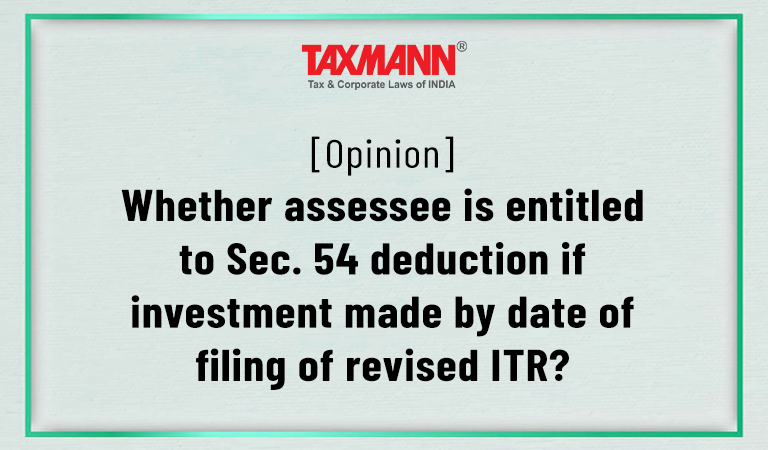[Opinion] Whether assessee is entitled to Sec. 54 deduction if investment made by date of filing of revised ITR?
- News|Blog|Income Tax|
- 2 Min Read
- By Taxmann
- |
- Last Updated on 22 November, 2022

Mukesh Kohli – [2022] 145 taxmann.com 81 (Article)
There is a dispute whether exemption under section 54 or 54F to be allowed in regard to the amount invested in purchase or construction of the Residential House till the date of filing of return of Income under section 139(1) or section 139(4) of the Income-tax Act, 1961.
Let us discuss the provisions of section 54 and section 139 and various case laws of this subject to get the answer
Section 54
Section 54 provides that long-term capital gains arising from transfer of a residential house is exempt from income-tax, if the amount of such capital gain is utilised to acquire/construct one residential house in India within specified period, subject to compliance of other conditions.
Conditions to claim exemption under section 54
Section 54 exemption is allowed to an individual or HUF from the long-term capital gains arising from transfer of capital asset, being residential house property. This exemption is allowed if following conditions are satisfied:
(a) The individual or HUF owns a long-term capital asset, being a residential house property or land appurtenant thereto.
(b) Such capital asset is transferred during the year.
(c) Long-term capital gains arise from transfer of such capital asset.
(d) The amount of capital gain is invested, by way of purchase or construction, in one residential house property.
(e) The purchase of new residential house should be made either within 1 year before the date of the transfer or within 2 years after the date of transfer of original capital asset.
(f) In case of construction, the new house should be constructed within 3 years after the date of transfer of old residential house.
(g) If the assessee has not utilized the capital gains by the due date of filing of return, then assessee should deposit the capital gains in Capital Gain Account Scheme.
If above conditions are satisfied, the quantum of exemption shall be the amount of long-term capital gains or aggregate of amount invested in new house property and amount deposited in Capital Gain Account scheme, whichever is lower.
Amendment made by the Finance Act, 2019
With effect from assessment year 2020-21, the Finance Act, 2019 has amended section 54 to extend the benefit of exemption in respect of investment made in two residential house properties. The exemption for investment made, by way of purchase or construction, in two residential house properties shall be available if the amount of long-term capital gains does not exceed Rs. 2 crores. If assessee exercises this option, he shall not be entitled to exercise this option again for the same or any other assessment year. In other words, the assessee can exercise this option only once in his lifetime.
The benefit of new provision is allowed from assessment year 2020-21 and onwards.
Click Here To Read The Full Article
Disclaimer: The content/information published on the website is only for general information of the user and shall not be construed as legal advice. While the Taxmann has exercised reasonable efforts to ensure the veracity of information/content published, Taxmann shall be under no liability in any manner whatsoever for incorrect information, if any.

Taxmann Publications has a dedicated in-house Research & Editorial Team. This team consists of a team of Chartered Accountants, Company Secretaries, and Lawyers. This team works under the guidance and supervision of editor-in-chief Mr Rakesh Bhargava.
The Research and Editorial Team is responsible for developing reliable and accurate content for the readers. The team follows the six-sigma approach to achieve the benchmark of zero error in its publications and research platforms. The team ensures that the following publication guidelines are thoroughly followed while developing the content:
- The statutory material is obtained only from the authorized and reliable sources
- All the latest developments in the judicial and legislative fields are covered
- Prepare the analytical write-ups on current, controversial, and important issues to help the readers to understand the concept and its implications
- Every content published by Taxmann is complete, accurate and lucid
- All evidence-based statements are supported with proper reference to Section, Circular No., Notification No. or citations
- The golden rules of grammar, style and consistency are thoroughly followed
- Font and size that’s easy to read and remain consistent across all imprint and digital publications are applied



 CA | CS | CMA
CA | CS | CMA
